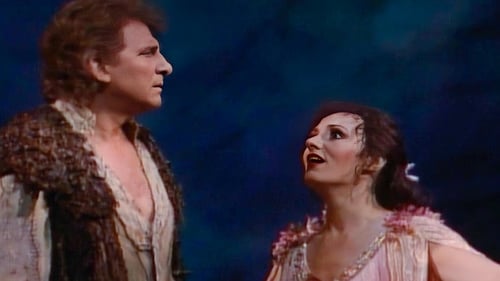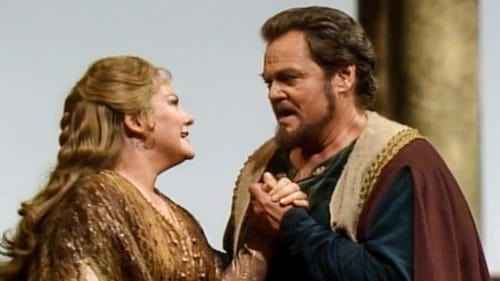Bernd Weikl
Nascimento : 1942-07-29, Wien, Austria

Sir John Falstaff

Sir Georg Solti leads the Wiener Philharmoniker in this intimate film of Strauss's comedy of manners. Using traditional sets and costumes, this is the only film version available of this opera. A talented cast includes Gundula Janowitz, Edita Gruberova, Bernd Weikl and Rene Kollo.

Amfortas
Wolfgang Wagner's Bayreuth production of his grandfather's 'farewell to the world'has 'an unusual beauty and logic of its own ... with a double stress - on nature undefiled and on a form of religious symbolism ... There is an air of magic and mystery about the staging ... The performance was excellent ... Horst Stein conducted a beautifully proportioned Parsifal'. New York Times

Peter Konwitschny's new production on the première stage in Munich gives it a new, optimistic interpretation. At the opening of the Munich Opera Festival 1998, Tristan und Isolde was staged in what is now the ninth new production at the Bavarian State Opera since its world première. Director Peter Konwitschny worked together with stage and costume designer Johannes Leiacker a team already well known in Munich for its much-respected Parsifal. Zubin Mehta conducted, shortly before being called to be General Music Director at the Bavarian State Opera. The title parts were interpreted by the American tenor Jon Frederic West, widely known for his Wagner-roles and Waltraud Meier, one of the greatest Isoldes of our time.

Amfortas
The Met production easily has the most beautiful staging, designed by Otto Schenck, who also produced the fabulous set for the Met's previous Ring cycle. Kurt Moll is a wonderful Gurnemanz, but compared to his studio recording under Karajan a decade earlier it has lost some of its original velvety body and luster. As Parsifal, Jerusalem is starting to show some wear and tear on his voice at the Met in 1992 as opposed to his prime form at Bayreuth in 1981, but is still quite good; only Placido Domingo could compete with him in the role at that time.

Hans Sachs
Richard Wagner's grandson, Wolfgang Wagner, staged and directed this performance of the legendary composer's most human of musical dramas at the 1984 Bayreuth Festival. Horst Stein directs the Bayreuth Festival Chorus and Orchestra and an all-star cast that includes Hermann Prey (as Beckmesser), Bernd Weikl (as Sachs), Siegfried Jerusalem (as Walter), Graham Clark (as David) and MariAnne Haggander (as Eva).

Wolfram von Eschenbach
As renowned for its harmonious overture as for its romantic storybook characters, this three-act masterwork features some of the composer’s most groundbreaking and unforgettable music, as well as a theme the young Wagner would revisit again and again later in his career—the redemptive and transcendent power of a woman’s love. The enchanting plot harks back to medieval history: Wolfram is a lovesick troubadour who desires the virtuous Elisabeth. She, however, has eyes for another: the rebellious knight Tannhäuser, who in turn cannot get over an overwhelming sensual experience in the realm of the goddess Venus, and is banished for singing her praises at court. Only saintly Elisabeth’s death can atone for his misdeeds.

Theodor Guschlbauer conducts the Chorus and Orchestra of the Vienna State Opera in this lavish staging of Johann Strauss's operetta. Recorded in 1980, the production features some of the leading performers of their day, including Lucia Popp, Edita Gruberova, Bernd Weikl, Walter Berry and Brigitte Fassbaender.

Wolfram von Eschenbach
TANNHÄUSER UND DER SÄNGERKRIEG AUF WARTBURG is a grand opera by Richard Wagner in three acts. After experiencing boundless sensuality and freedom with the fun-loving Venus (soprano), the singer Tannhäuser (Tenor) finds it impossible to conform to the cultured setting of his betrothed Elizabeth (soprano), who loves him. During a singing contest, Tannhäuser describes the affair with Venus as the ultimate love experience and because of that, he is cast out from the established society. Thanks to Elizabeth's intervention, he is allowed to undertake a pilgrimage to the Pope to ask for the Holy Father's pardon. If the Pope accepts to forgive him, he would be allowed to take back his place in society. Tannhäuser accepts. But fate will not allow him to meet with his beloved Elizabeth again in this life. This is a recording of the legendary staging by Götz Friedrich for the 1978 Bayreuth Festival conducted by Sir Colin Davis.

Jochanaan
This filmed version of Strauss' shocker features Teresa Stratas as opera's most depraved teenager, and she's as perfect a Salome as one would ever hope to see or hear. Stratas inhabits the role, exploring the character's sensuousness as she vainly woos Jochanaan, her venomous hatred when she's rejected, the crazed look in her eyes when she demands his head--on a silver platter, no less. Such complete identification with a role, especially of a character so malignant helps make this 1974 Salome stand out among the many fine DVDs of the opera.

Herrufer
The nearest Wagner ever got to religion was worshiping himself. Using opulent music he delivers his audience to an easy, pseudo-mystical experience. In this, one of his earlier operas, he is already showing signs of the mastery of the superlative that later would blossom fully together with his egomania.









